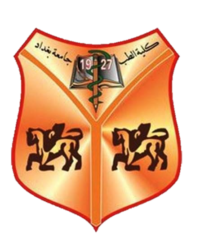Medical Education Unit
Mission
To promote professionalism and excellence in medical education.
Introduction
Medical education is one of the most important academic disciplines due to the decreasing number of healthcare professionals, the increasing complexity of diagnosis and treatment, and the increasing expectations of society for better health outcomes.
Over the past few decades, rapid changes in medical education trends (due to the increasing needs and priorities in providing health services to the community) have led to a major change in the curricula of undergraduate students in many medical schools around the world.
The College of Medicine at the University of Baghdad has a project that has been implemented to review the curriculum, not only at the content level but also to change the strategies (for example, the system-based and integrated system will be applied) used in presenting the new curriculum.
This new curriculum will encourage a broader, holistic view of medical education and will lay a strong foundation for lifelong medical education, which will help improve the quality of medical education provided so that the student is better prepared to meet the upcoming challenges in his medical practice during his coming years.
Accordingly, the Deanship of the College of Medicine has responded decisively and appropriately to the major changes in medicine and medical education to ensure that graduates are well prepared to meet the challenges in their medical practice. Through this vision, the college felt the urgent need to establish a formal medical education unit linked to it at the administrative level and financial support to take on the major tasks in the future.
Mission of the Medical Education Unit
As one of the leading medical colleges in Iraq, the Medical Education Unit at the College of Medicine in Baghdad has objectives including providing educational and consulting programs to form an ideal doctor for the twenty-first century.
- The immediate and primary objective of the Medical Education Unit is to plan and direct the activities of the College of Medicine in Baghdad to obtain international accreditation according to global standards.
The Medical Education Unit is based on a foundation of innovation and educational leadership to focus on six main points of activity:
- Development of faculty members.
- Development and support of the medical curriculum.
- Development of professionalism in medical education.
- Research in medical education.
- Evaluation/assessment.
- Program testing and quality assurance.
Administrative Structure
The opening of the Medical Education Unit was officially approved by the decision of the esteemed University of Baghdad Council No. (48266) on August 26, 2012.
The head and members of the unit were selected by Prof. Dr. Mohi Al-Janabi, Dean of the College of Medicine at that time:
- Head of the Unit: Assistant Professor Dr. Kifah Hamdan Abdul Ghafoor ([email protected])
- Members:
- Assistant Professor Dr. Batoul Ali Ghaleb ([email protected])
- Assistant Professor Dr. Zina Hassan Abdul Qahar ([email protected])
- Assistant Professor Dr. Muhammad Qasim Yahya ([email protected])
- Assistant Professor Dr. Samara Muwaffaq Ali Hussein ([email protected])
- Assistant Professor Dr. Noor Saadi Hassan ([email protected])
- Secretariat: Mrs. Hadeel Abdul Hadi Mohsen
Partnership
- Nottingham Medical School, UK
- Sheffield Medical School, UK
- University of North Carolina, USA
- Sultan Qaboos University, Oman
Address:
Medical Education Unit
College of Medicine / University of Baghdad
Bab Al-Muadham
Secretariat Phone: 07712770684
Email: [email protected]
Previous Activities and Working Committees
Before the reopening of the Medical Education Unit and its official approval, a project was initiated in 2010 to modernize medical education. This included implementing an interactive, student-based system, adding a research component, and introducing competency assessment methods such as the Structured Clinical Examination (OSCE).
A higher committee for curriculum development was formed, involving the dean, council members, and modular unit officials. The committee conducted weekly meetings and discussions to plan and build the new curriculum.
- Faculty Development Committee: 6 members
- Logistics Study Committee: 6 members
- Questionnaires and Feedback Committee: 6 members
- Student Evaluation/Assessment Committee: 8 members
Future Plans
The path of the Medical Education Unit is still long, with only the first steps taken. After obtaining international accreditation, the unit aims to:
- Maintain and develop this achievement by creating a postgraduate program.
- Achieve ideal integration with the Ministry of Health and its institutions.
This effort seeks to uphold the reputation of the Iraqi doctor, known for intelligence and dedication, and to ensure continued excellence in medical education.

